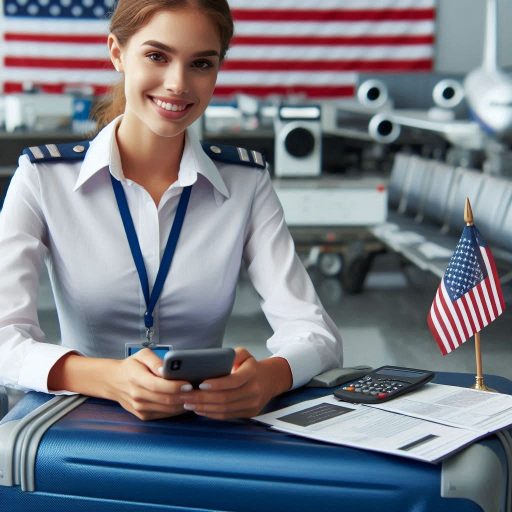Introduction
A baggage handler plays a crucial role in the travel industry.
These professionals manage and transport luggage at airports.
They ensure that bags are loaded, unloaded, and delivered safely.
Baggage handlers work in a fast-paced environment, often under pressure.
Their work directly affects the travel experience for passengers.
Baggage handlers perform various tasks.
They load luggage onto aircraft and unload it upon arrival.
They also transport baggage between terminals and aircraft.
These workers operate equipment such as tugs and conveyor belts.
Safety is a top priority, as they handle heavy loads.
They must also be aware of hazardous materials in luggage.
Each bag requires careful handling to avoid damage.
The importance of baggage handlers cannot be overstated.
They help keep flights on schedule by managing time efficiently.
Their work contributes to the overall flow of airport operations.
When baggage handlers do their job well, passengers experience less stress.
Delays and lost luggage can negatively impact travel plans.
Efficient baggage handling improves customer satisfaction and airport efficiency.
To become a baggage handler, you need to follow specific steps.
First, obtain a high school diploma or GED.
This educational background is often a requirement for employers.
Next, look for job openings at local airports.
Many airlines and ground service companies hire baggage handlers.
Submit your resume and application to these companies.
Research the Role of a Baggage Handler
Before embarking on the journey to become a baggage handler, it is essential to understand the role and responsibilities associated with the job.
Conducting thorough research will provide valuable insights into what to expect in this line of work.
Responsibilities and Duties
Baggage handlers are responsible for loading and unloading luggage to and from aircraft, as well as sorting and transporting baggage within airport terminals.
They play a crucial role in ensuring the smooth flow of operations.
Physical Demands
It is important to note that baggage handling is a physically demanding job that requires individuals to lift heavy luggage, work in various weather conditions, and be on their feet for extended periods.
Prospective baggage handlers should be prepared for this aspect of the job.
Types of Baggage Handling Jobs
There are different types of baggage handling jobs within the aviation industry.
Some roles may involve primarily loading and unloading luggage from aircraft, while others may focus on sorting and transporting baggage within the airport.
By researching the various types of baggage handling jobs available, individuals can identify the specific role that aligns with their skills and preferences.
This will help in making an informed decision when pursuing a career in this field.
Overall, conducting thorough research on the role of a baggage handler will provide valuable insights into the responsibilities, physical demands, and different job options available in the industry.
Meet the Basic Requirements
High School Diploma or Equivalent
First, you need a high school diploma or an equivalent qualification.
This education provides you with basic skills necessary for the job.
Many airlines prefer candidates with a high school education.
It demonstrates your ability to complete tasks and follow instructions.
If you didn’t finish high school, consider obtaining a GED.
This credential can open doors to various job opportunities.
Clear Criminal Record
Next, you must have a clear criminal record.
Airlines prioritize safety and trust.
A clean background check reassures employers about your reliability.
This requirement helps maintain a secure working environment.
Employers often conduct thorough background checks before hiring.
Be prepared to provide necessary documentation to prove your record is clear.
Physical Fitness and Ability to Lift Heavy Luggage
Physical fitness is crucial for a baggage handler.
You will need to lift heavy luggage regularly.
The job requires lifting bags that can weigh up to 100 pounds or more.
Strong muscles and good endurance help you perform these tasks efficiently.
You should be prepared to move quickly and handle multiple bags simultaneously.
Staying fit reduces your risk of injury on the job.
Consider incorporating strength training into your routine to build the necessary muscle.
Strong Communication Skills
Additionally, strong communication skills are vital in this role.
You will work closely with other team members and airline staff.
Effective communication ensures smooth operations and enhances teamwork.
You may need to relay information quickly to avoid delays.
Clear communication also helps in problem-solving situations.
Miscommunication can lead to lost luggage or delayed flights, which you want to avoid.
Practice speaking clearly and confidently to improve your skills.
In a nutshell, meeting the basic requirements is crucial for becoming a baggage handler.
A high school diploma provides the foundation for your skills.
A clear criminal record builds trust with your employer.
Physical fitness prepares you for the demands of the job.
Strong communication skills ensure effective teamwork and problem resolution.
Take time to assess whether you meet these requirements before applying.
If you need to improve your fitness, consider a workout routine.
Focus on strength training to build muscle.
Additionally, work on your communication skills to enhance your candidacy.
By meeting these basic requirements, you will enhance your chances of securing a job as a baggage handler.
This role can lead to further opportunities in the airline industry.
Make sure you’re ready to take the next steps in your career journey.
Read: Customer Service Tips for Pet Grooming Professionals
Gain Relevant Experience
Look for Entry-Level Positions in the Transportation or Logistics Industry
Start by searching for entry-level positions in the transportation or logistics industry.
Many companies offer roles that don’t require extensive experience.
These positions allow you to learn essential skills while building your resume.
Search job boards and company websites for openings.
Apply to various roles, such as warehouse worker or delivery driver.
These entry-level jobs can provide a solid foundation for your career.
Volunteer or Intern at Airports or Transportation Companies
Volunteering or interning at airports or transportation companies can provide invaluable experience.
Many airports offer internship programs for individuals interested in aviation.
These programs often allow you to work alongside seasoned professionals.
You can learn about airport operations, safety protocols, and customer service.
Additionally, volunteering can help you build connections in the industry.
These connections may lead to future job opportunities and provide essential networking advantages.
Gain Experience Working with Luggage or Cargo Handling
Consider gaining experience specifically related to luggage or cargo handling.
Some companies focus solely on freight or baggage management.
Working with these companies will deepen your understanding of the field.
You’ll learn how to handle various types of cargo and luggage effectively.
This experience will make you more competitive for baggage handler positions.
Participate in training programs offered by transportation companies or organizations.
Many of these programs provide hands-on training in cargo and baggage handling.
They often cover topics like loading procedures, safety guidelines, and equipment usage.
Completing a training program can enhance your resume and set you apart.
Employers value candidates who show initiative and dedication to their craft.
Networking is also a crucial step in gaining experience.
Attend industry events, workshops, or seminars related to transportation and logistics.
Connect with professionals in the field and ask for advice or mentorship.
Building relationships with experienced individuals can provide valuable insights.
They might also inform you about job openings or internship opportunities.
In addition to formal experiences, consider any related part-time jobs.
Roles in retail, warehousing, or customer service can develop transferable skills.
You’ll learn how to manage time, communicate effectively, and work in a team.
These skills are essential for a successful baggage handler.
Highlight these experiences on your resume.
Lastly, maintain a positive attitude and a strong work ethic.
Employers appreciate candidates who demonstrate reliability and a willingness to learn.
Show enthusiasm for the role and the industry during interviews.
This positive approach can make a lasting impression.
By gaining relevant experience, you’ll position yourself as a strong candidate for baggage handler positions.
Read: Nail Technician Etiquette: Dos and Don’ts
Obtain Necessary Certifications
Obtaining a Ramp or Baggage Handling Certification
Start by obtaining a ramp or baggage handling certification.
Many organizations offer courses that cover essential skills for this role.
These courses typically teach proper lifting techniques and equipment usage.
A certification shows employers you understand safety protocols and procedures.
Consider enrolling in a local community college or vocational school for training options.
Complete Training Programs Offered by Transportation Companies or Airports
Next, complete training programs offered by transportation companies or airports.
These programs provide hands-on experience and valuable knowledge.
They often cover topics such as baggage claim processes, loading and unloading procedures, and equipment operation.
Participating in these programs helps you gain practical skills directly related to the job.
Additionally, they can introduce you to industry professionals and potential employers.
Obtaining Security Clearances Required for Working in Restricted Areas
Some employers require you to obtain security clearances for working in restricted areas.
This step is crucial, as baggage handlers often work near secure zones.
Security clearances ensure that you can access areas where sensitive operations occur.
To obtain these clearances, you may need to submit personal information for background checks.
Be prepared to provide documentation of your work history and any prior security clearances.
After completing these steps, keep your certifications up to date.
Many certifications require renewal every few years.
Staying current with your training demonstrates your commitment to safety and professionalism.
Employers appreciate candidates who actively pursue ongoing education and skills development.
In summary, obtaining necessary certifications involves several key steps.
Start by securing a ramp or baggage handling certification through reputable courses.
Next, participate in training programs provided by transportation companies or airports.
Finally, ensure you have the required security clearances to work in restricted areas.
Following these steps will enhance your qualifications and prepare you for a successful career as a baggage handler.
By taking these actions, you position yourself as a strong candidate in the competitive job market.
Your certifications will reflect your dedication to the role.
Employers will recognize your commitment to safety and efficiency in baggage handling.
As you progress in your career, these qualifications can lead to new opportunities and advancements within the industry.
Read: Developing Patience and Precision in Pet Grooming

Develop Key Skills
Developing Excellent Communication Skills
Effective communication is crucial in this position.
You will often interact with team members and other airport personnel.
Clear communication helps prevent misunderstandings and ensures smooth operations.
Practice active listening to understand instructions better.
Additionally, learn to convey information succinctly to avoid confusion.
This skill enhances teamwork and improves overall efficiency.
Improve Your Physical Strength and Stamina
Baggage handling is a physically demanding job.
Regularly lifting heavy bags and equipment is part of the daily routine.
To thrive, focus on building your physical strength.
Engage in strength-training exercises to increase muscle power.
Incorporate cardio workouts to improve your stamina.
This preparation allows you to perform tasks efficiently throughout your shift.
Consider activities like jogging, cycling, or swimming to enhance your fitness level.
Transform Your Career Today
Unlock a personalized career strategy that drives real results. Get tailored advice and a roadmap designed just for you.
Start NowHone Your Problem-Solving Skills and Attention to Detail
Baggage handlers often encounter unexpected challenges.
Developing problem-solving skills prepares you to handle various situations.
For example, you might face delays or misrouted luggage.
An analytical mindset helps you assess situations quickly and find solutions.
Practice staying calm under pressure to think clearly.
Attention to detail is equally vital.
Missing small details can lead to significant issues.
Train yourself to notice specifics, such as bag tags and weight limits, to avoid mistakes.
Practice Working Efficiently and Quickly in a Fast-Paced Environment
Airports are bustling hubs where efficiency is key.
Baggage handlers must complete tasks quickly while maintaining accuracy.
To improve your speed, practice time management skills.
Break down tasks into manageable steps and prioritize them.
Work on your hand-eye coordination for smoother movements.
Familiarize yourself with the layout of the airport to navigate efficiently.
Developing a routine helps streamline your workflow and reduces stress.
Seek Feedback and Continuous Improvement
After developing these skills, seek feedback from colleagues and supervisors.
Constructive criticism helps you identify areas for improvement.
Regularly reflect on your performance and adjust your techniques accordingly.
Attend workshops or training sessions to enhance your abilities further.
Continuous learning ensures you stay updated with industry standards and practices.
By focusing on these essential skills, you will prepare yourself for a successful career as a baggage handler.
Dedication and effort in developing these abilities will set you apart in this competitive field.
Embrace the challenge, and you will thrive in your new role.
Read: Tips for Nail Technicians Working in High-End Salons
Apply for Baggage Handler Jobs
Job openings at airports, airlines, or transportation companies
Finding job opportunities as a baggage handler can be an exciting and rewarding experience.
To get started, it’s essential to actively search for job openings at airports, airlines, or transportation companies.
These organizations often have a need for skilled individuals to manage baggage and ensure smooth operations.
Tailor your resume and cover letter to highlight relevant experience and skills
Tailoring your resume and cover letter to showcase your relevant experience and skills is crucial when applying for baggage handler positions.
Make sure to highlight any previous work in a related field, such as logistics, transportation, or customer service.
Emphasize your ability to work efficiently in fast-paced environments and your attention to detail.
Once you’ve submitted your application, it’s essential to prepare for potential interviews.
Practice common baggage handler job interview questions to familiarize yourself with what to expect.
Questions may include inquiries about your experience handling luggage, your ability to work under pressure, and your knowledge of safety protocols.
Prepare for interviews by practicing common baggage handler job interview questions
By preparing thoroughly for each step of the application process, you can increase your chances of landing a baggage handler job.
Stay proactive in your job search, showcase your relevant skills, and demonstrate your dedication to providing excellent service. Good luck with your job hunt!
Start Your Career as a Baggage Handler
Starting Your Career
Starting your career as a baggage handler is an exciting and rewarding journey.
Whether you are looking to work at an airport or a transportation company, there are a few important steps to follow to kick start your career in baggage handling.
Here are some key points to consider when beginning your career in this field.
Research and Apply
The first step to becoming a baggage handler is to research various job opportunities at airports or transportation companies.
Look for open positions that match your skills and experience level.
Once you have found a suitable job opening, submit your resume and cover letter to apply for the position.
Gain Relevant Experience
If you do not have any prior experience in baggage handling, consider taking up an entry-level position at an airport or transportation company.
This will give you the opportunity to learn the basics of baggage handling from experienced professionals in the field.
Training and Certification
To excel as a baggage handler, it is essential to undergo proper training and obtain relevant certifications.
Many airports and transportation companies offer on-the-job training programs to teach new employees the ins and outs of baggage handling.
Additionally, you may also need to obtain certifications in areas such as forklift operation and hazardous materials handling.
Follow Safety Protocols
As a baggage handler, you will be responsible for moving luggage and cargo safely and efficiently.
It is crucial to follow all safety protocols and procedures to prevent accidents and injuries.
Make sure to wear appropriate safety gear, use proper lifting techniques, and adhere to all safety guidelines set by your employer.
Develop Skills
To become a successful baggage handler, you should work on developing essential skills such as attention to detail, time management, and physical fitness.
These skills will help you handle baggage effectively and ensure that luggage is transported securely to its destination.
Build Relationships
Networking is key in the aviation industry.
Take the time to build relationships with your colleagues, supervisors, and other professionals in the field.
This will not only help you learn from experienced baggage handlers but also open up opportunities for career growth and advancement.
Stay Updated
The aviation industry is constantly evolving, and it is essential to stay updated on the latest trends and technologies in baggage handling.
Attend workshops, seminars, and training sessions to keep yourself informed about new developments in the field and upgrade your skills accordingly.
Starting your career as a baggage handler requires dedication, hard work, and continuous learning.
By following the steps mentioned above and staying committed to your goals, you can embark on a successful and fulfilling career in baggage handling.
Conclusion
Baggage handlers play a vital role in the travel industry by ensuring the safe and efficient handling of passengers’ luggage.
Without their dedication and hard work, the travel experience for passengers would be chaotic and disorganized.
For those who aspire to become successful baggage handlers, it is essential to follow the key steps outlined in this guide.
By gaining relevant experience, obtaining the necessary certifications, and developing strong communication and teamwork skills, aspiring baggage handlers can increase their chances of success in this competitive field.
It is important for aspiring baggage handlers to remain determined and dedicated to achieving their career goals.
While the job of a baggage handler can be physically demanding and fast-paced, it can also be rewarding and fulfilling for those who have a passion for working in the travel industry.
Ultimately, aspiring baggage handlers should pursue their career goals with determination and dedication, knowing that their role is crucial in ensuring a positive travel experience for passengers around the world.




